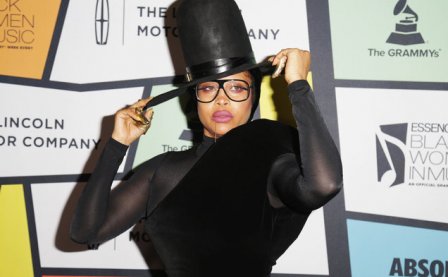As its cover art would suggest, Erykah Badu has returned her gaze to earthly concerns on the second New Amerykah album, though — as on its predecessor — her work is as idiosyncratic as ever. In “20 Feet Tall,” Return of the Ankh’s opening cut, Badu reminds herself of her colossal stature: “If I get off my knees, I might recall I’m 20-feet tall,” she repeats succinctly, but it’s also straightforwardly surreal. It’s a fitting primer for the rest of the record, which combines her trademark psychedelia with disarming emotional candor.
This odd concoction marks a break from the paranoia and anger of 4th World War, but it’s far from anything resembling a return to her organic, neo-soul roots. There’s no place for militancy, political rancor, or five-percenter theology on Return of the Ankh; true to her self-claimed “Bag Lady” identity, Badu sounds baggy — loose and comfortable — when only two years ago, she was tense and truculent. On “Window Seat,” as amniotic a slow jam as Badu has ever recorded, she sings yearningly about wanting “A chance to fly/ A chance to cry/ And a long bye bye.” Her atypical directness is couched, typically enough, between references to “Star Trek” and time travel. Throughout the whole album, her diction is similarly loopy, but far less arcane and impenetrable than she has been lately. Regardless of the artistic distance that she’s covered since her debut, Badu has never crafted a record as emotionally distilled, as full of Baduisms, as Return of the Ankh.
Despite its cogent emotional articulation, Return of the Ankh’s instrumentation is remarkably stoned and inscrutable. “Umm Hmm,” co-produced by Badu and Madlib, is to R&B what Ariel Pink is to AOR Rock, which is to say that what appears to be an accessible pop melody is filtered through a faintly-received AM-radio haze until rendered unrecognizable. Badu makes these unexpected artistic decisions almost constantly, but rather than fostering a distance between her and her audience, these odd choices turn the album into a virgin landscape begging to be explored. “Incense,” another Madlib-assisted track, sounds like nothing Badu — or any other contemporary, major-label artist — is producing; here, the artist camouflages herself in layers of harp and radio signal distortion, blending fully into the scenery. The fearlessness required to retain such a gorgeous and wonderfully pointless song within a (relatively) concise record is admirable.
This fearlessness is what makes Badu one of the most important artists currently working in the music industry, major label or otherwise. It’s an absolute triumph that Motown CEO Sylvia Rhone has yet to intercede, to force Badu to trim the periphery of her grounds and put out a commercially viable single (like “Jump In the Air,” the Lil Wayne- and Bilal-assisted iTunes bonus track). Indeed, Badu has refined her authorial vision on Return of the Ankh, creating one of her most vital records to date. Despite her frequent afronautic impulses, Badu succeeds in simultaneously keeping her head in the firmament and both feet planted firmly on the ground.
More about: Erykah Badu




